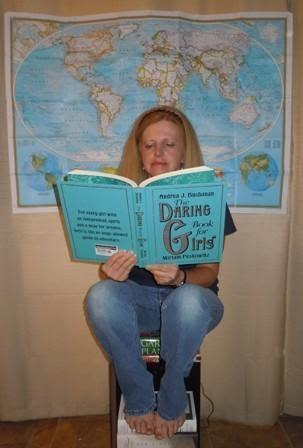Cheryl Hughes: Wasper
On the afternoon of Easter Sunday, my granddaughter, Sabria, came to my house and announced she was going to walk out into my backyard and see what the Easter Bunny had left her. A few seconds later, she ran back in and announced, “I’m not going back out there! There’s a wasper out there!”
“It’s wasp, not wasper,” I said, “I don’t know why Kentucky people say wasper.”
“Gee!” Sabria said, with hands on her hips and a scowl on her face, “We ARE Kentucky people!”
She had me there. I have heard that word all my life, and I became curious about how and where it originated. According to an entry on steemit.com, wasper is a regional term used mostly in the Appalachian communities of Kentucky and Tennessee.
There’s an interesting back-and-forth on the website straightdope.com in which people weigh in on whether or not they have ever heard the word—94.71 percent had not—and a lively discussion on the origin of wasper ensued.
Some of the observations were: the word has Elizabethan English origins or that it evolved from the German word for wasp (wespe) or—my personal favorite—it is a reference to a person who eradicates wasps as an occupation, a Wasp-er.
I remember being traumatized by the red version of the species when I was a child. The kids in my family slept upstairs in an old farmhouse, and just like heat, wasps tend to rise to the highest spot in the house. I reacted the same way every time I encountered a wasp, I would scream and flail my arms, which meant inevitably I would be stung. I know, I know, traditional wisdom tells you to be still, but I challenge you to do that if a wasp or wasper is flying around your face.
I’ve noticed from reading articles on BBC.com that the British refer to yellow jackets and hornets as wasps, as well. There is an article on the site that reports a resident in the community of Delamere was stung 42 times by wasps before he could escape the little critters. There was a picture of a yellow jacket next to the article with tips on what not to do if you are attacked by a swarm.
The site advises against flailing your arms—yeah, learned that one the hard way. It also says, “Wasps will not be fooled by anyone who tries to play dead.” (There are cases, however, where that ploy worked on grizzly bear attacks.) Diving under water doesn’t work either, as “wasps will simply wait for you to re-emerge.”
The British Pest Control Association (BPCA) explains that a wasp which feels threatened emits a pheromone that sends out a distress call to members of its colony. The members respond to the 911 alert and arrive as back-up.
As an adult, I’ve been stung several times by wasps dive bombing into my hair—Garey says they think it’s some sort of nest…I am not amused—and going down the back of my neck into my shirt. During an instance like that, I rarely stand still without flailing my arms, like all the experts who have never been stung by a wasp tell you to do.
There are environmental-friendly concoctions online meant to repel wasps from any area you don’t want them to build. They contain ingredients like peppermint oil, baby shampoo, cinnamon and chili peppers. I prefer the traditional Hot Shot Wasp and Hornet spray or in extreme cases, the flame thrower.
I understand wasps are beneficial in the way they eat grub worms and weevils and other crop-destroying insects, but when I come upon a nest in my storage building, I still want to annihilate the little habitat. It’s a “get it before it gets me” response to my old foe.
I’ve noticed there are people selling wasp nests online, as well as wasp carcasses. They are marketed as teaching devices. I guess there are people who have never seen wasps in their natural habitat. They need to contact me. They can have all my wasps for free. They will have to pay for the waspers, however, since they are only found in Kentucky and Tennessee.



























